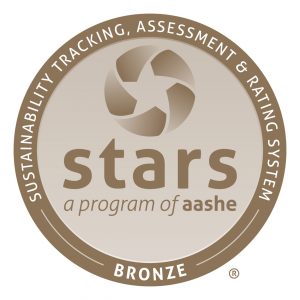
UM students sample local foods and learn about sustainable options in the Lafayette-Oxford-University community during a campus Sustainability Fair. Photo by Kevin Bain/Ole Miss Digital Imaging Services
OXFORD, Miss. – The University of Mississippi has earned a bronze rating from a global higher education association in recognition of its innovative sustainability efforts on campus.
The Association for the Advancement of Sustainability in Higher Education issues the Sustainability Tracking, Assessment and Rating System, known as STARS, measures to universities around the world as a global sustainability standard to encourage sustainability in all aspects of higher education.
STARS is a reporting metric that helps universities measure sustainability performance, taking into account social, environmental and economic factors.
“As a member of the Climate Leadership Network, the university works to advance sustainability through academics, service learning opportunities and the work of individual departments and offices,” Interim Chancellor Larry Sparks said. “We are committed to being good stewards of our resources, and this achievement is an outstanding recognition of our efforts to promote efficient and sustainable practices on our campus.”
The four categories assessed are academics, engagement, administration, and operations and planning.
 The STARS rating is a significant achievement for the university and for everyone across campus who contributes to sustainability work in some way, said Ian Banner, university architect and director of facilities planning and the Office of Sustainability.
The STARS rating is a significant achievement for the university and for everyone across campus who contributes to sustainability work in some way, said Ian Banner, university architect and director of facilities planning and the Office of Sustainability.
“The data collected represents several years of sustainability work campuswide, performed by a large group of dedicated people,” he said. “We hope it serves an empirical guide to enable us to develop future sustainability projects.”
Completing the STARS assessment revealed sustainability work happening on campus in many areas, said Lindsey Abernathy, associate director of the UM Office of Sustainability. Completing the STARS assessment also gives Ole Miss administrators baseline information about its sustainability performance, which Abernathy said is key to making informed decisions and prioritizing future projects.
“That was the goal for this first submission: to find out, to the best of our ability, what we’re doing and how that compares to what could be done,” she said. “Many universities have used the STARS framework to create a comprehensive plan for sustainability, and it is my hope that we can use the information in the same way, involving voices from across campus in the process.”
A few notable achievements mentioned in the report include M Partner, which simultaneously addresses all three components of sustainability; hands-on learning opportunities for students, such as UM’s student-run restaurant, Lenoir Dining, which is Green Restaurant Certified; and tenets of sustainability included throughout the UM Master Plan.
With more than 800 participants in 30 countries, the STARS program is the most widely recognized framework in the world for publicly reporting comprehensive information related to a college or university’s sustainability performance.
“STARS was developed by the campus sustainability community to provide high standards for recognizing campus sustainability efforts,” said Meghan Fay Zahniser, AASHE executive director. “The University of Mississippi has demonstrated a substantial commitment to sustainability by achieving a STARS Bronze Rating and is to be congratulated for their efforts.”
For more information about the STARS program or to view the university’s STARS report, visit https://stars.aashe.org/.